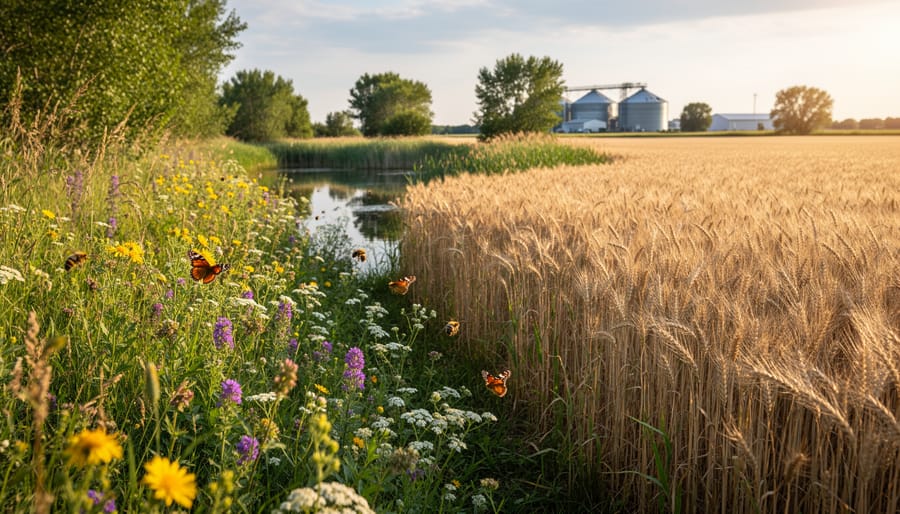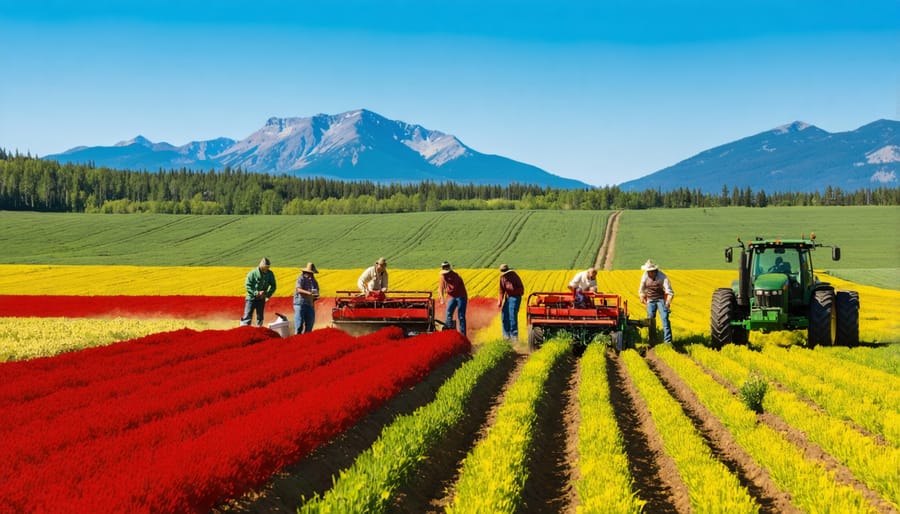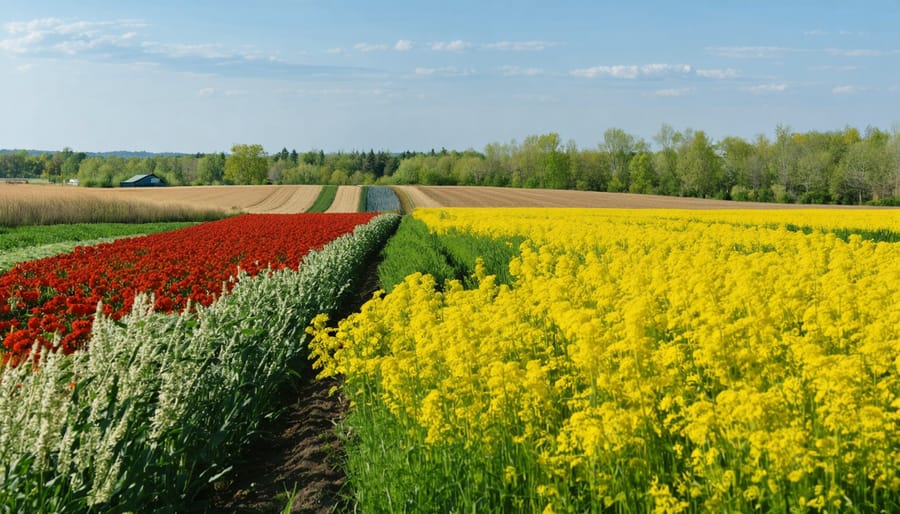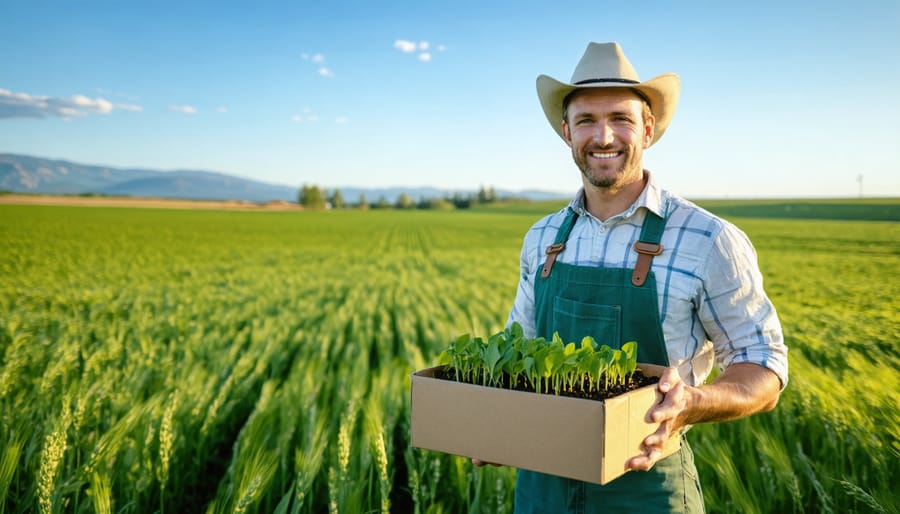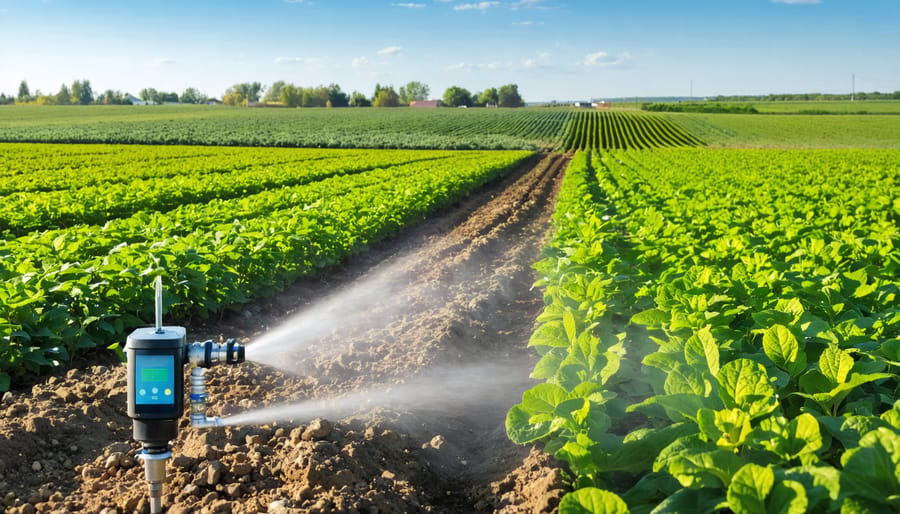Transform agricultural supply chains by implementing transparent pricing models, direct farmer partnerships, and ethical sourcing standards that create lasting economic stability for rural communities. Building fair supply chains across Alberta’s agricultural sector requires systematic collaboration between producers, distributors, and consumers, establishing clear accountability at every stage of food production and distribution.
Canadian farmers pioneering sustainable agriculture practices demonstrate that equitable trade relationships generate 15-30% higher returns while fostering community resilience and environmental stewardship. By integrating traditional farming wisdom with modern supply chain technology, Alberta’s agricultural sector is creating a blueprint for ethical food systems that ensure fair compensation, protect worker rights, and maintain high environmental standards from field to table.
This practical approach to supply chain equity isn’t just about better prices – it’s about building lasting partnerships that strengthen local food security, support indigenous farming practices, and create measurable social impact throughout the Prairie provinces.
The Building Blocks of Fair Trade Supply Chains
Fair Pricing Structures
Fair pricing in agricultural supply chains operates on a transparent formula that ensures farmers receive a sustainable income while maintaining reasonable consumer costs. In Alberta, successful fair trade partnerships typically establish a minimum price guarantee that protects farmers from market volatility, plus a premium that supports community development projects.
For example, grain farmers in central Alberta participating in fair trade programs receive a baseline price of 15-20% above conventional market rates, providing crucial stability during unpredictable seasons. This pricing structure includes both immediate payment upon delivery and potential year-end bonuses based on market performance.
The premium component, usually 5-10% above the base price, goes directly into community initiatives such as infrastructure improvements or educational programs. Local cooperatives, like the Peace Region Organic Producers Association, have used these premiums to fund grain storage facilities and processing equipment that benefit entire farming communities.
For consumers, this translates to a modest price increase of typically 10-15% at retail, but ensures product quality and supports sustainable farming practices. Many Alberta retailers have found that transparent pricing actually increases customer loyalty, as consumers appreciate knowing exactly how their purchases support local farmers.
This balanced approach creates a win-win situation: farmers receive fair compensation for their work, while consumers gain access to high-quality, ethically produced agricultural products.
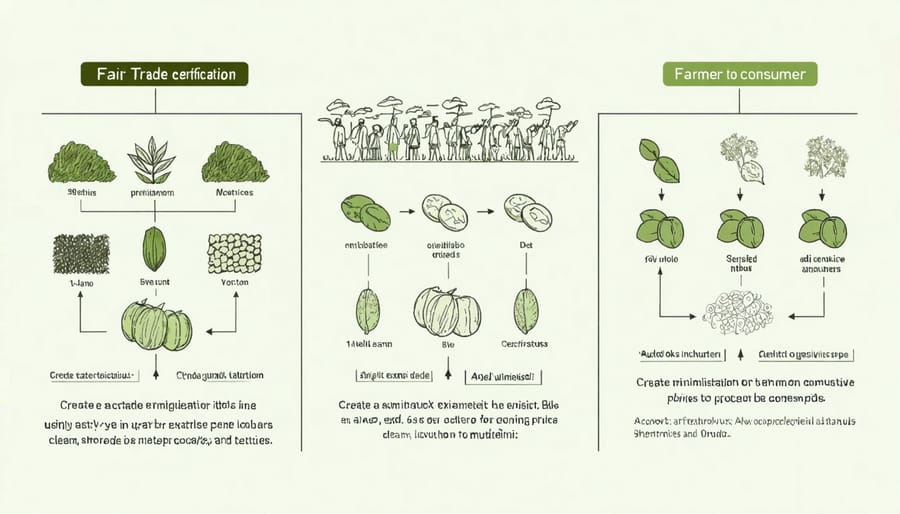
Transparent Supply Chain Partnerships
Building strong partnerships across the agricultural supply chain requires commitment to openness and mutual trust. For Alberta farmers, establishing these relationships means creating clear communication channels with processors, distributors, and retailers. Through transparent supply chain tracking, farmers can share vital information about their production methods, harvest dates, and sustainability practices.
Local success stories, like the Prairie Organic Grain Initiative, demonstrate how transparency builds lasting partnerships. Farmers participating in this program regularly connect with processors through organized meet-ups and digital platforms, sharing everything from soil management practices to crop rotation schedules.
Clear documentation and regular updates help maintain trust between partners. Many Alberta farmers now use digital tools to record and share their farming practices, allowing buyers to verify fair trade claims and sustainable methods. This transparency often leads to premium pricing and preferred supplier status.
Consider implementing regular partner meetings, whether virtual or in-person, to discuss challenges and opportunities. Maintain detailed records of your sustainable practices and be ready to share them with partners. Remember, successful partnerships are built on mutual understanding and shared goals for sustainable agriculture.
Implementing Fair Trade Practices in Alberta
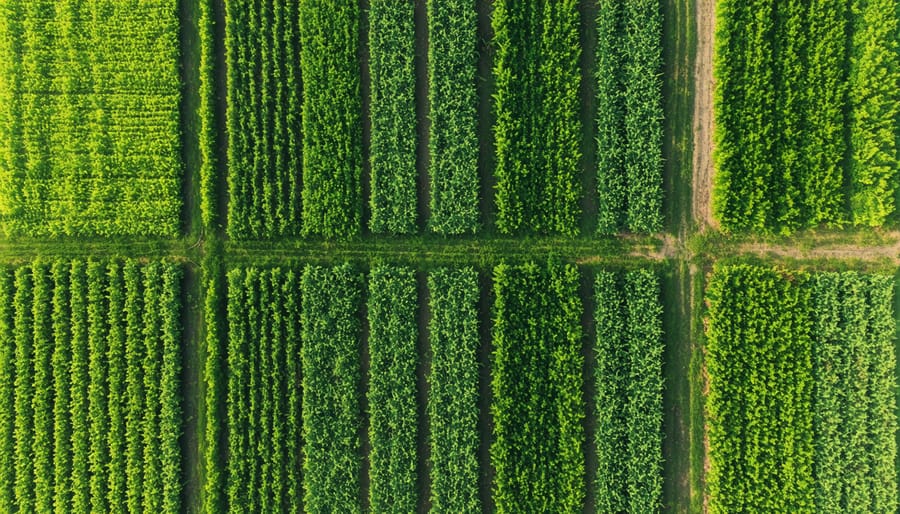
Local Success Stories
The Larson Family Farm in Lacombe has become a shining example of fair trade success in Alberta’s agricultural landscape. After implementing fair trade practices in their grain operations three years ago, the Larsons have seen a 30% increase in their profit margins while building lasting relationships with ethical buyers across North America.
Sarah Chen, who operates a 200-hectare organic vegetable farm near Lethbridge, partnered with local food cooperatives to establish transparent pricing and fair labor practices. Her initiative has created stable employment for 15 local workers and resulted in premium pricing for her produce at farmers’ markets throughout Southern Alberta.
The Mountain View Collective, a group of five family farms in Central Alberta, demonstrates the power of community-based fair trade. By pooling resources and establishing direct relationships with processors and retailers, they’ve eliminated middle-person markups while ensuring fair compensation for all participants. Their model has increased member farms’ income by an average of 25% since implementation.
In Red Deer County, the Peterson Heritage Farm transitioned to fair trade practices for their honey production in 2019. Through direct partnerships with specialty food stores and conscious consumers, they’ve expanded their market reach while maintaining control over pricing and distribution. Their success has inspired neighboring beekeepers to adopt similar practices, creating a growing network of fair trade honey producers in the region.
Certification and Compliance
Obtaining fair trade certification in Canada involves a structured process that begins with meeting the basic requirements set by Fairtrade Canada. As an Alberta farmer, you’ll need to demonstrate sustainable farming practices, fair labor conditions, and transparent supply chain documentation.
The certification process typically takes 4-6 months and requires an initial farm audit. During this assessment, inspectors will evaluate your farming practices, worker conditions, and record-keeping systems. Key compliance areas include maintaining minimum price guarantees for products, ensuring safe working conditions, and implementing environmental protection measures.
To streamline your certification journey, start by conducting a self-assessment using Fairtrade Canada’s producer standards checklist. Essential documentation includes employment records, environmental impact assessments, and detailed product traceability systems. Many Alberta farmers find success by working with local agricultural cooperatives that provide guidance through the certification process.
Regular monitoring and annual audits ensure ongoing compliance. Costs vary based on farm size but typically range from $2,000 to $5,000 for initial certification, with annual renewal fees around $1,500. Financial support is available through various Canadian agricultural programs to help offset these costs.
Remember that certification requirements may vary depending on your specific crops and production methods. Consider joining local fair trade farmer networks for peer support and shared learning experiences. The Prairie Organic Grain Initiative offers valuable resources for Alberta farmers transitioning to certified fair trade practices.
Building Community Networks
Building strong community networks is essential for successful fair trade practices in agriculture. Alberta farmers have discovered that collaboration through local food supply chains creates resilient partnerships that benefit everyone involved.
Start by connecting with neighbouring farms through local agricultural associations and farmer’s markets. These connections often lead to resource sharing, knowledge exchange, and collective bargaining power. The Southern Alberta Organic Network, for example, has successfully united over 100 farmers, creating a supportive ecosystem for sustainable practices.
Consider establishing regular meetups or workshops where producers can share experiences and best practices. The Red Deer Agricultural Society hosts monthly gatherings that have sparked numerous collaborative initiatives among local farmers.
Digital platforms also play a crucial role in network building. Join online forums and social media groups dedicated to Canadian sustainable agriculture. These platforms help you stay connected with peers across the province and share real-time market information.
Partner with local food cooperatives and community-supported agriculture (CSA) programs. These partnerships provide stable markets and direct connections with consumers who value fair trade practices. The Edmonton Food Hub demonstrates how coordinated efforts between farmers can create efficient distribution systems while maintaining fair pricing structures.
Remember to document and share your success stories, as they inspire others and strengthen the community’s commitment to fair trade principles.
Environmental Benefits of Fair Trade Supply Chains
Soil Health and Biodiversity
Fair trade practices have shown remarkable benefits for soil health and biodiversity across Alberta’s agricultural landscape. When farmers receive fair compensation for their products, they can invest in sustainable soil management practices that benefit both their operations and the environment.
In the Prairie regions, fair trade certified farms consistently demonstrate higher levels of soil organic matter and improved soil structure. Local studies show that these farms typically maintain 15-20% more ground cover throughout the year, reducing erosion and supporting beneficial soil microorganisms.
The impact on biodiversity is equally significant. Fair trade farms in Alberta maintain, on average, 30% more natural habitat areas than conventional operations. These areas serve as corridors for wildlife and support essential pollinators. A recent study in Southern Alberta found that fair trade certified farms hosted 40% more native bee species compared to conventional farms.
Fair trade certification encourages farmers to implement buffer zones between crops and water bodies, creating vital habitats for local flora and fauna. These practices have led to increased sightings of threatened species, including the Sprague’s Pipit and the Swift Fox, on certified properties.
The economic stability provided by fair trade enables farmers to take a longer-term view of land management. Many Alberta producers report investing in cover cropping, reduced tillage, and habitat restoration projects that might otherwise be financially challenging under conventional market pressures.
Through fair trade practices, farmers can maintain both profitable operations and healthy ecosystems, proving that environmental stewardship and economic success can go hand in hand.

Carbon Footprint Reduction
Fair trade practices in agriculture significantly contribute to reducing carbon emissions through multiple interconnected approaches. In Alberta’s agricultural sector, fair trade certified farms typically implement sustainable farming methods that prioritize soil health and carbon sequestration. These practices include minimal tillage, crop rotation, and the use of cover crops, which help store carbon in the soil rather than releasing it into the atmosphere.
Local fair trade cooperatives in Canada have demonstrated that shorter supply chains lead to decreased transportation emissions. For instance, the Southern Alberta Fair Trade Network has reduced their shipping distances by 40% through regional distribution networks, cutting transport-related carbon emissions by approximately 2.5 tonnes annually.
Fair trade certification also encourages farmers to adopt renewable energy solutions and energy-efficient equipment. Many certified farms in Alberta now use solar-powered irrigation systems and energy-efficient grain dryers, resulting in an average 30% reduction in fossil fuel consumption.
Additionally, fair trade premiums often fund community projects focused on environmental sustainability. These initiatives include tree-planting programs, which serve the dual purpose of carbon sequestration and providing natural windbreaks for crops. Several Alberta farming communities have successfully established agricultural forestry projects, combining productive farming with carbon capture benefits.
By supporting biodiversity and traditional farming methods, fair trade practices help maintain resilient agricultural systems that naturally absorb and store carbon while producing food sustainably.
Economic Advantages for Canadian Farmers
Fair trade practices offer substantial economic advantages for Canadian farmers, particularly those operating in Alberta’s diverse agricultural landscape. Based on recent data from the Canadian Fair Trade Network, farmers participating in fair trade programs typically see a 15-25% increase in their net income compared to conventional trading arrangements.
One of the most significant benefits is price stability. Fair trade agreements often include minimum price guarantees, protecting farmers from market volatility that can devastate farm revenues. For instance, grain farmers in central Alberta reported maintaining profitable operations during the 2021 price fluctuations thanks to their fair trade partnerships.
Direct market access represents another crucial advantage. By eliminating unnecessary intermediaries, farmers can secure a larger share of the final product value. Prairie wheat producers participating in fair trade networks report receiving up to 30% more for their crops compared to traditional supply chain arrangements.
Premium payments constitute an additional revenue stream. These funds, typically 10-15% above the agreed-upon price, support community development and farm improvements. In 2022, Alberta’s fair trade farming communities invested these premiums in modern irrigation systems, increasing yield efficiency by 20%.
Long-term contracts provide financial planning stability, enabling farmers to make informed investments in their operations. This security has led to documented improvements in farm sustainability and operational efficiency. A study of southern Alberta farms showed that those with fair trade agreements were 40% more likely to invest in advanced farming equipment and sustainable practices.
Access to credit also improves under fair trade arrangements. Banks and credit unions often view fair trade contracts as reliable income indicators, making it easier for farmers to secure loans for expansion or equipment upgrades. This has resulted in a 25% increase in approved agricultural loans for fair trade participants compared to non-participating farmers.
The collective bargaining power within fair trade networks helps reduce input costs through bulk purchasing arrangements. Alberta farming cooperatives report saving 12-18% on essential supplies through their fair trade partnerships, directly improving their bottom line.
Fair trade practices offer a compelling path forward for Canadian farmers looking to enhance their market position while contributing to sustainable agriculture. Throughout this guide, we’ve explored how fair trade certification can lead to better pricing, stronger community relationships, and improved environmental stewardship. For Alberta farmers considering this transition, the journey begins with assessing your current operations and identifying potential fair trade partners in your region.
To get started, connect with local agricultural cooperatives and fair trade organizations, who can provide guidance on certification requirements and market opportunities. Consider joining existing farmer networks that have successfully implemented fair trade practices – their experience can prove invaluable. The Canadian Fair Trade Network offers resources and support specifically tailored to our agricultural community.
Remember that fair trade isn’t just about certification – it’s about building lasting relationships and sustainable practices that benefit everyone in the supply chain. Start small, perhaps with one crop or product line, and gradually expand as you become more comfortable with fair trade principles. With dedication and the right support, you can join the growing community of Canadian farmers who are proving that ethical agriculture is both sustainable and profitable.
Take the first step today by reaching out to your local agricultural extension office or fair trade organization to learn more about certification opportunities in your area.


